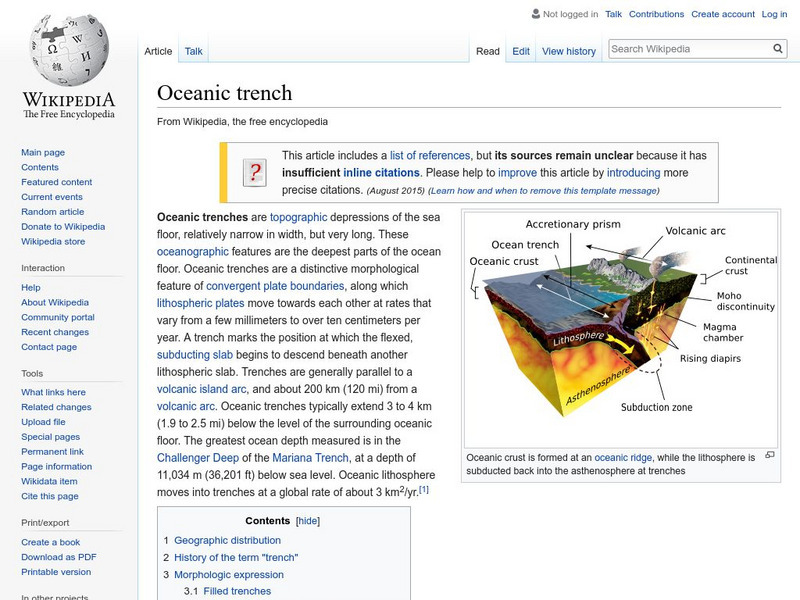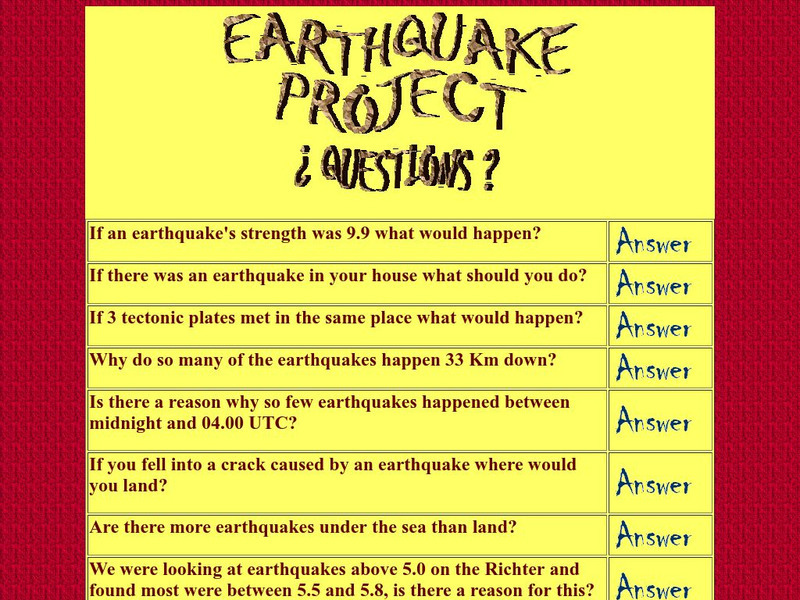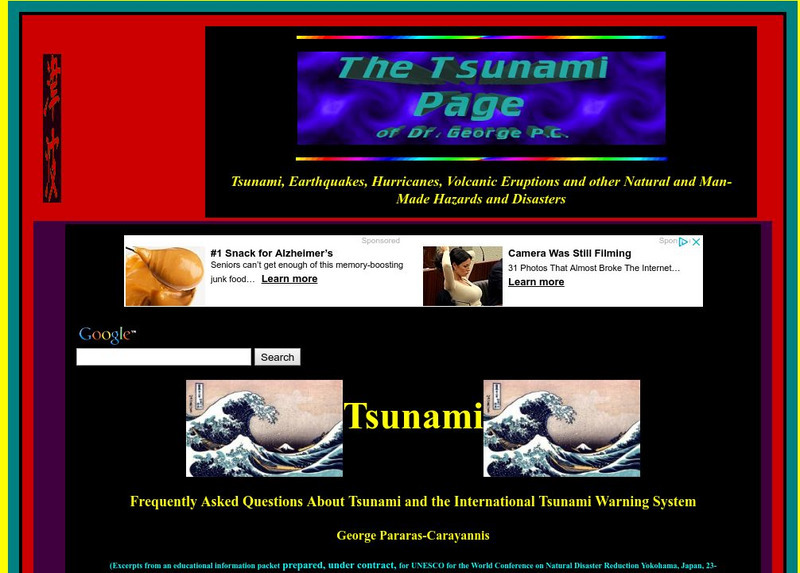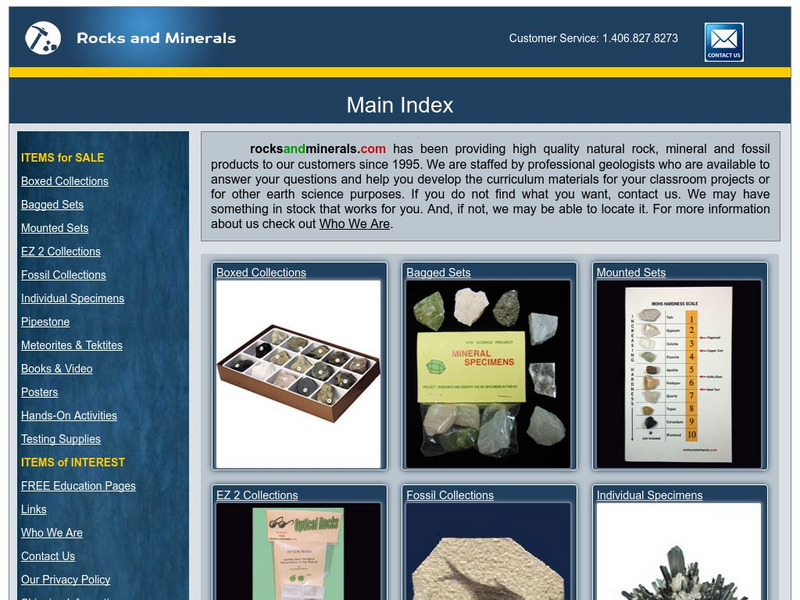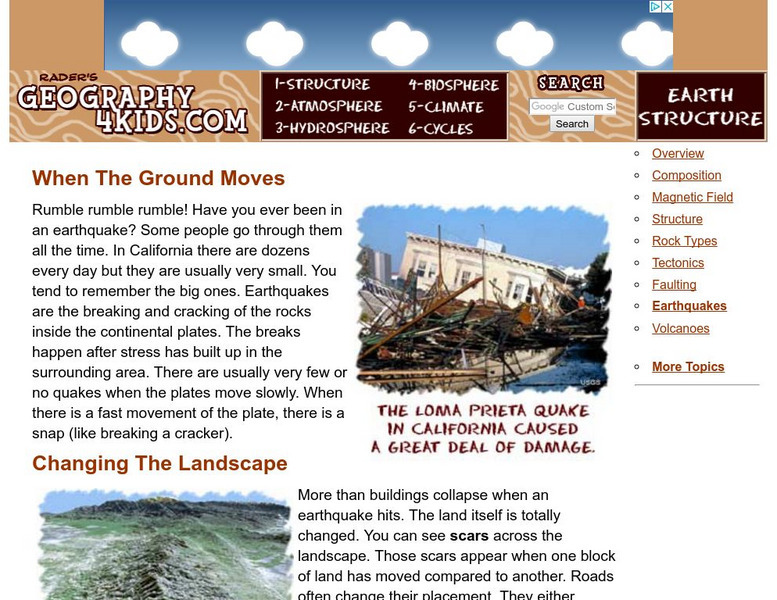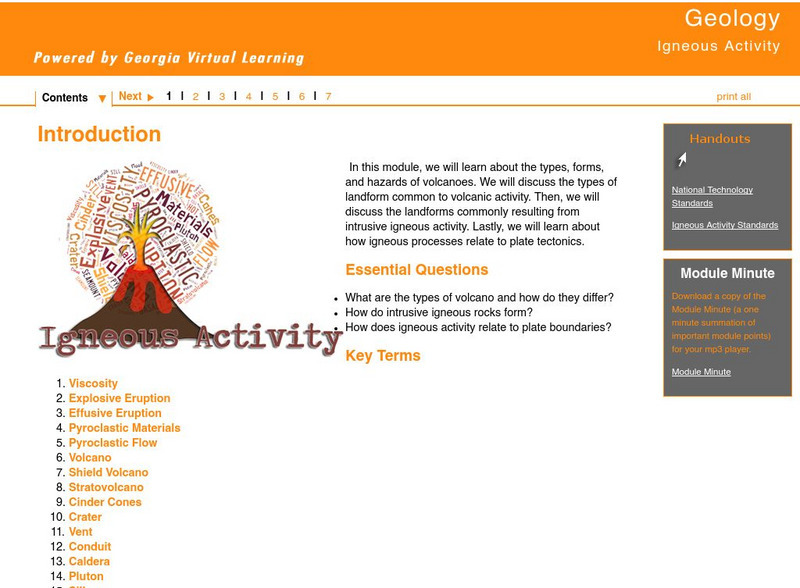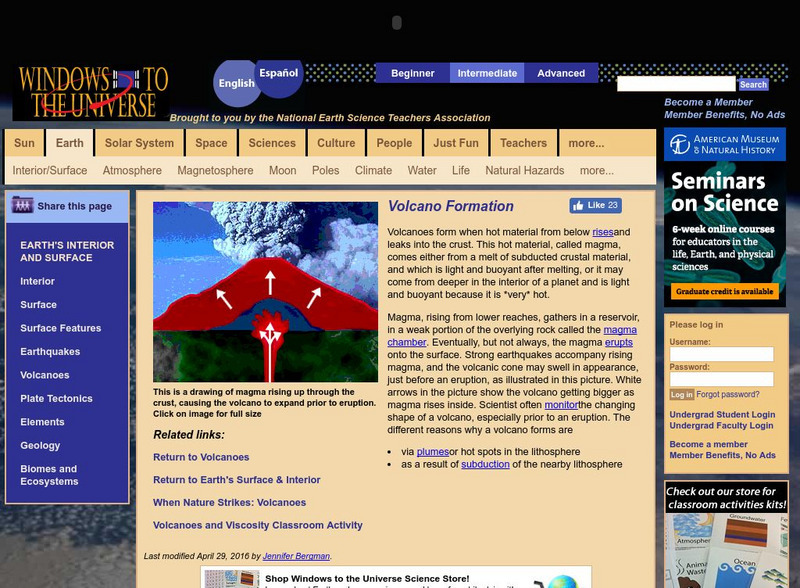Wikimedia
Wikipedia: Oceanic Trench
Wikipedia provides brief information on oceanic trenches, and has a hyperlinked list of major world trenches.
Other
Dromore National School: Earthquake Project Questions
Read the questions students most often ask about earthquakes and read the answers.
Treehut
Suzy's World: Earth
At this site from Suzy's World and Suzy Cato, you can find out what the earth is made of and try an experiment.
Other
Ceri: Earthquake Facts and Follies
A list of frequently asked questions about earthquakes. This is a good source for earthquake trivia and separating fact from fiction.
Discovery Education
Discovery Education: Volcano Lesson Plan
Use this site to understand how volcanoes work.
Science Struck
Science Struck: Underwater Volcano Facts
Provides information about underwater volcanoes.
Other
Disaster Pages: The Tsunami Page
FAQs about tsunamis address the reasons they occur and the destruction they cause. Also, learn about systems in place that provide Tsunami warnings as well as the data collected by scientists studying violent earthquakes and seismic sea...
Bill Nye
Bill Nye: Move Mountains
Try this at-home science experiment to learn how to make mountains.
Curated OER
Extreme Science: A Lesson in Plate Tectonics
With its clickable map, this site provides text and graphics on spreading boundary, converging boundary, subduction zone, transverse boundaries and faults.
Geography 4 kids
Geography4 kids.com: When the Ground Moves
Understand the process of an earthquake.
US Geological Survey
U.s. Geological Survey: Volcanoes of the u.s.
This graphical and textual journey about the US volcanoes was made by Steven Brantley. There is an introduction, volcanoes and plate tectonics, Hawaiian volcanoes, cascade volcanoes, restless volcanoes, a glossary and further readings.
Smithsonian Institution
National Museum of Natural History: Paleobiology: Geologic Time: Hadean Eon
Journey into the past while reading this comprehensive overview of the Hadean Eon that covers topics such as the formation of the earth, its surface and atmosphere, fossil evidence, erosion and plate tectonics.
Georgia Department of Education
Ga Virtual Learning: Igneous Activity
In this interactive tutorial you will learn about the types, forms, and hazards of volcanoes. The types of landform common to volcanic activity is discussed. Then, the landforms commonly resulting from intrusive igneous activity are...
Curated OER
Unesco: Australia: Macquarie Island
Macquarie Island (34 km long x 5 km wide) is an oceanic island in the Southern Ocean, lying 1,500 km south-east of Tasmania and approximately halfway between Australia and the Antarctic continent. The island is the exposed crest of the...
Other
Digital Library for Earth System Education: Teaching Box: Earthquake Country
A suite of lessons focusing on all aspects of earthquakes. Inquiry-based exploration of earthquakes includes measuring seismic waves, predicting earthquakes, investigating magnitude and intensity, mapping fault lines, and evaluating...
National Earth Science Teachers Association
Windows to the Universe: Volcano Formation
Explanation of the factors that result in the formation of volcanoes, some basic but helpful animations and photographs.
Other
Earth History: The Paleomap Project
The Paleomap Project illustrates the plate tectonic development of the ocean basins and continents, as well as the changing distribution of land and sea during the past 1,100 million years.
TED Talks
Ted: Ted Ed: What Happens When Continents Collide?
Tens of millions of years ago, plate tectonics set North and South America on an unavoidable collision course that would change the face of the Earth and spell life or death for thousands of species. Juan D. Carrillo explains the massive...
University of California
University of California Museum of Paleontology: Distribution in Time and Space
The Understanding Evolution site provides evidence for evolution in biogeography utilizing relative dating, geography, and plate tectonics.
PBS
Nova: The Big Chill
Explore some of the explanations for the ice ages that have occurred in the Earth's history. The explanations are all related to conditions caused by plate tectonics.
University of Colorado
University of Colorado: Seismic Waves
Basic definitions and characteristics of the different wave types, diagrams, and speeds of the waves. Has links to information on seismology, earthquakes, and plate tectonics.
The Franklin Institute
Franklin Institute Online: Earthforce in the Crust
Learn more about earthquakes as well as plate tectonics. Site offers links to current quakings as well as earthquake science, teacher lessons, interactives, and earthquake history.
TED Talks
Ted: Ted Ed: How North America Got Its Shape
Peter J. Haproff explains how it took millions of years and some incredible plate tectonics to forge the continent we know today. [4:57]
Other popular searches
- Map of Tectonic Plates
- Floating Tectonic Plates
- Geography Tectonic Plates
- Pacific Basin Tectonic Plates
- Movement of Tectonic Plates
- Tectonic Plates Converge
- Tectonic Plates Move Apart
- Tectonic Plates Oranges
- Edible Tectonic Plates
- Tectonic Plates and Volcanoes


